With Additional Reporting by John Gideon
 On Friday, November 25, a news story appeared in the San Francisco Chronicle by political writer John Wildermuth reporting that the California Secretary of State's office would be allowing Election Reform activists to perform an attempted hack of voting machines on Wednesday, November 30th. That report was soon picked up by the Associated Press and other outlets where it was repeated, in part, in newspapers, radio and television across the nation. Headlines along the line of "Hacker to try to attack state voting machines" were blared across the media throughout the holiday weekend.
On Friday, November 25, a news story appeared in the San Francisco Chronicle by political writer John Wildermuth reporting that the California Secretary of State's office would be allowing Election Reform activists to perform an attempted hack of voting machines on Wednesday, November 30th. That report was soon picked up by the Associated Press and other outlets where it was repeated, in part, in newspapers, radio and television across the nation. Headlines along the line of "Hacker to try to attack state voting machines" were blared across the media throughout the holiday weekend.
While the story seems to be based in some reality, reporting by The BRAD BLOG over the last several days has revealed that the matter seems to be a far cry from the way it has been reported by the Mainstream Media. In fact, while negotiations for such a test are ongoing, the parameters to be used are still being hashed out, no definite schedule has yet to be determined, and Finnish computer scientist Harry Hursti, who created this particular method for hacking into Diebold voting machines has made no plans at this time to travel to the United States to perform the hack attempt.
Such a test, if performed, could be crucial to a decision soon to be made by CA Sec. of State Bruce McPherson about whether to allow various Diebold voting systems in the state. That decision, in turn, will likely effect decisions by other states and counties around the U.S., all of whom are facing a January 1, 2006 deadline set by the Help America Vote Act (HAVA) to be met if jurisdictions are to receive millions of dollars in Federal money to help pay for "upgraded" Electoral Systems.
California's Republican Sec. of State McPherson had famously refused to re-certified Diebold's AccuVote TSx touch-screen voting machines over the summer after a major test in the state had found that some 20% of the machines had failed to perform as promised with printers jamming and screens freezing at an unacceptable rate. Diebold's machines had previously been de-certified by former Democratic Sec. of State Kevin Shelley. McPherson's sudden about-face concerning Diebold has caught many by surprise. The potential change of position towards Diebold was discovered recently and sent a shockwave through the Election Reform activist community who then converged on Sacramento to complain about the apparent flip-flop by the Sec. of State.
The Mainstream Media --- Apparently Misled by the Sec. of State --- Gets It All Wrong?
In his article for the Chronicle, Wildermuth leads off with the following information:
"A computer hacker will be trying to break into one of California's electronic voting machines next week, with the full cooperation of the secretary of state."
The report seems to be based on information Wildermuth was given by CA Sec. of State spokesperson, Nghia Nguyen Demovic. In speaking about the test, Ms. Demovic is quoted as saying, "This is part of our security mission. We want to make sure that every vote is counted and registered correctly.''
The article goes on to say that the test will be conducted on a machine selected randomly from one of the 17 California counties that currently use the Diebold system. The article also states that Diebold wanted the test to be accomplished on a machine that they would provide for the test but that such a condition was opposed by both the state and the critics of the company.
The Facts Comes to Light...
The fact is that the facts stated above and in the Wildermuth/Associated Press articles are not factual. Information gathered from several sources at BlackBoxVoting.org (BBV), the organization who originally arranged for computer scientist Hursti to perform a similar hack on Diebold election machines in Leon County, FL claim that, though negotiations for a similar test in California are on-going, the parameters for such a test have not yet been agreed upon, and Hursti has not been notified to make travel-plans to come to Sacramento to perform his test. BBV has offered more details about the ongoing negotiations on their website.
Was the reporter given misinformation by the Secretary of State's spokeswoman? The BRAD BLOG has been unable to contact Demovic at the SoS office over the holiday weekend, but we will attempt to do so as soon as possible and will report back with any additional information we are able to receive.
The BRAD BLOG has learned, however, from BBV that though Hursti has been in contact with someone representing the Secretary of State's office, there has been no formal invitation for him to fly from his home in Finland to do any testing as of this time.
There has also been no final agreements made on any of the protocol and ground rules to be used in the test. For example, no decision has yet been made on the contentious matter of where the machine, or machines in the test, will come from. Comments from BBV have indicated that there is still confusion on whether a Diebold-supplied machine will be used, or whether, as they prefer, a machine will be selected from one of the many that have already been used in a California election.
BBV Board Member Jim March recently told us via Email that BBV "want[s] test protocols that meet a minimum level of scientific validity, such as voting machines that are of the type currently in use and randomly picked from California counties like Alameda, Placer, etc."
State Wants Test Results of Diebold's Secret Software to be Kept a Secret...
More troubling details are revealed in the proposed test parameters, as published on the BBV website [PDF] which mysteriously only cover the Diebold Optical-scan system and do not mention the more controversial Diebold TSx touch-screen devices.
The parameters as proposed would institute a 30-day confidentiality period and require all participants in the test to sign confidentiality agreements! In other words it could be late January ? long after the HAVA deadline has come and gone --- before any official results are released from the test?if it is ever actually performed.
With just over one month left before HAVA's January 1, 2006 deadline by which time Boards of Election around the country must have made decisions about their new voting equipment, any such test results warning against the purchase of Diebold equipment might come too late.
The test confidentiality agreement allows Diebold to keep the results secret. So if the hack is successful no one will know about it until after they have made their decision and signed contracts. Imagine New York or New Jersey, or any of the other states now deciding on new voting technology, finding out only after they have chosen to enter into multi-million dollar contracts with Diebold, that the system they chose had failed testing in California and the California Secretary of State knew all about the failure but was sworn to secrecy.
Ian Hoffman of The Oakland Tribune offers a more accurate account today of the ongoing story, avering that such a test will most likely not occur until Mid-December if at all. His story also gives more details on the two different 'hack tests' that both the state and the activists hope to see performed.
The BRAD BLOG has learned, from sources at BBV, that the non-profit Election Reform watchdog group is keenly interested in being allowed to perform these tests, but have concerns that the ground-rules to be set offer a level playing which hasn't been gamed-in-advance by specially prepared Diebold voting machinery and software.
BBV's March and founder Bev Harris --- both of whom were awarded money in a previous settlement with Diebold brokered by the state of California concerning a challenge to the Voting Machine Company's prior contractual failures in the state --- have expressed concerns about being "gag-ordered" and disallowed from video-taping and retaining original contemperaneous results from any such test.
Diebold, who along with ES&S currently count more than 80% of America's votes have come under a great deal of criticism by Election Reform and Voting Rights advocates charging that their secret software, protected from public scrutiny as a "proprietary trade secret" is buggy, unreliable and unsecure.
As previously reported by BRAD BLOG, a "Cyber Alert Warning" issued by a branch of the U.S. Department of Homeland Security warned prior to last year's Presidential Election that the Diebold Central Tabulator software had an "undocumented backdoor" which allows for a single malicious user to access and change the results of any Diebold-run election.
As well, a recent report by the non-partisan Governmental Accountability Office (GAO) --- still completely unreported by the mainstream media more than a month after its release --- found that electronic voting machines and tabulator were susceptible to hackers and, in fact, have been responsible for losing votes all together in recent elections.
Diebold's CEO Walden O'Dell has been oft-quoted he infamously promised to deliver the electoral votes for the state of Ohio --- where Diebold, Inc. is headquartered and where last year's Presidential Election was decided --- to George W. Bush in a non-infamous fundraising letter to high-level GOP donors prior to the election last year.
The Secretary of State's office has asked for public comment about their possible re-certification of Diebold equipment in the state. To submit a comment, visit www.ss.ca.gov/elections/elections_vs.htm, call (916) 653-6814 or email votingsystemcomment@ss.ca.gov.


 The GOP 'Voter Fraud'
The GOP 'Voter Fraud'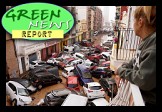 'Green News Report' 10/31/24
'Green News Report' 10/31/24
 'Closing Arguments'
'Closing Arguments' Trump Promises to be a Lawless, Authoritarian President. Believe Him: 'BradCast' 10/29/24
Trump Promises to be a Lawless, Authoritarian President. Believe Him: 'BradCast' 10/29/24 'Green News Report' 10/29/24
'Green News Report' 10/29/24 Election Heats Up: Ballots Burn, Billionaires 'Obey in Advance', Callers Ring In: 'BradCast' 10/28/24
Election Heats Up: Ballots Burn, Billionaires 'Obey in Advance', Callers Ring In: 'BradCast' 10/28/24 Musk's Privatized Internet Satellite System Threatens U.S. National Security
Musk's Privatized Internet Satellite System Threatens U.S. National Security Sunday 'VOTE NOW!' Toons
Sunday 'VOTE NOW!' Toons Harris on Hope, Trump's Fasc-ism in Bumpy Closing Days: 'BradCast' 10/24/24
Harris on Hope, Trump's Fasc-ism in Bumpy Closing Days: 'BradCast' 10/24/24 'Green News Report' 10/24/24
'Green News Report' 10/24/24 Kelly on Trump: 'Fascist', Admires Hitler, Disrespects Constitution and Disabled Vets: 'BradCast' 10/23/24
Kelly on Trump: 'Fascist', Admires Hitler, Disrespects Constitution and Disabled Vets: 'BradCast' 10/23/24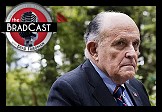 Accountability Comes For Rudy, Other Election Deniers: 'BradCast' 10/22/24
Accountability Comes For Rudy, Other Election Deniers: 'BradCast' 10/22/24 'Green News Report' 10/22/24
'Green News Report' 10/22/24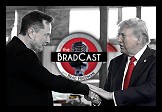 Elon Musk's 'Vote Buying' and Lying for Trump: 'BradCast' 10/21/24
Elon Musk's 'Vote Buying' and Lying for Trump: 'BradCast' 10/21/24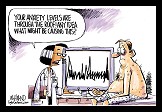 Sunday 'High Anxiety' Toons
Sunday 'High Anxiety' Toons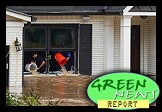 'Green News Report' 10/17/24
'Green News Report' 10/17/24 Fake v. Real Censorship and Trump/Fox Fetish-ized Grievance World: 'BradCast' 10/17/24
Fake v. Real Censorship and Trump/Fox Fetish-ized Grievance World: 'BradCast' 10/17/24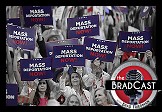 'Americans Aren't Prepared for Trump's Police State': 'BradCast' 10/16/24
'Americans Aren't Prepared for Trump's Police State': 'BradCast' 10/16/24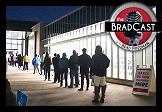 Good News for Georgia Voters, the Economy and Kamala Harris: 'BradCast' 10/15/24
Good News for Georgia Voters, the Economy and Kamala Harris: 'BradCast' 10/15/24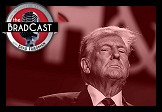 Fascism Comes to America: 'BradCast' 10/14/24
Fascism Comes to America: 'BradCast' 10/14/24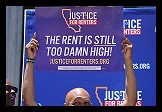 Institutional Landlords Flood CA Voters With Deceptive Ads on Props 33 and 34
Institutional Landlords Flood CA Voters With Deceptive Ads on Props 33 and 34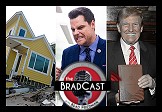 Milton's Mess, FL's U.S. House Liars, Trump's Made-in-China Bibles: 'BradCast' 10/10/24
Milton's Mess, FL's U.S. House Liars, Trump's Made-in-China Bibles: 'BradCast' 10/10/24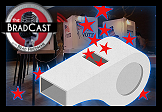 Whistleblower Org Readies to Support Election Officials: 'BradCast' 10/9/24
Whistleblower Org Readies to Support Election Officials: 'BradCast' 10/9/24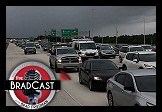 Florida Braces for 'Devastating to Catastrophic' Milton: 'BradCast' 10/8/24
Florida Braces for 'Devastating to Catastrophic' Milton: 'BradCast' 10/8/24
 VA GOP VOTER REG FRAUDSTER OFF HOOK
VA GOP VOTER REG FRAUDSTER OFF HOOK Criminal GOP Voter Registration Fraud Probe Expanding in VA
Criminal GOP Voter Registration Fraud Probe Expanding in VA DOJ PROBE SOUGHT AFTER VA ARREST
DOJ PROBE SOUGHT AFTER VA ARREST Arrest in VA: GOP Voter Reg Scandal Widens
Arrest in VA: GOP Voter Reg Scandal Widens ALL TOGETHER: ROVE, SPROUL, KOCHS, RNC
ALL TOGETHER: ROVE, SPROUL, KOCHS, RNC LATimes: RNC's 'Fired' Sproul Working for Repubs in 'as Many as 30 States'
LATimes: RNC's 'Fired' Sproul Working for Repubs in 'as Many as 30 States' 'Fired' Sproul Group 'Cloned', Still Working for Republicans in At Least 10 States
'Fired' Sproul Group 'Cloned', Still Working for Republicans in At Least 10 States FINALLY: FOX ON GOP REG FRAUD SCANDAL
FINALLY: FOX ON GOP REG FRAUD SCANDAL COLORADO FOLLOWS FLORIDA WITH GOP CRIMINAL INVESTIGATION
COLORADO FOLLOWS FLORIDA WITH GOP CRIMINAL INVESTIGATION CRIMINAL PROBE LAUNCHED INTO GOP VOTER REGISTRATION FRAUD SCANDAL IN FL
CRIMINAL PROBE LAUNCHED INTO GOP VOTER REGISTRATION FRAUD SCANDAL IN FL Brad Breaks PA Photo ID & GOP Registration Fraud Scandal News on Hartmann TV
Brad Breaks PA Photo ID & GOP Registration Fraud Scandal News on Hartmann TV  CAUGHT ON TAPE: COORDINATED NATIONWIDE GOP VOTER REG SCAM
CAUGHT ON TAPE: COORDINATED NATIONWIDE GOP VOTER REG SCAM CRIMINAL ELECTION FRAUD COMPLAINT FILED AGAINST GOP 'FRAUD' FIRM
CRIMINAL ELECTION FRAUD COMPLAINT FILED AGAINST GOP 'FRAUD' FIRM RICK SCOTT GETS ROLLED IN GOP REGISTRATION FRAUD SCANDAL
RICK SCOTT GETS ROLLED IN GOP REGISTRATION FRAUD SCANDAL VIDEO: Brad Breaks GOP Reg Fraud Scandal on Hartmann TV
VIDEO: Brad Breaks GOP Reg Fraud Scandal on Hartmann TV RNC FIRES NATIONAL VOTER REGISTRATION FIRM FOR FRAUD
RNC FIRES NATIONAL VOTER REGISTRATION FIRM FOR FRAUD EXCLUSIVE: Intvw w/ FL Official Who First Discovered GOP Reg Fraud
EXCLUSIVE: Intvw w/ FL Official Who First Discovered GOP Reg Fraud GOP REGISTRATION FRAUD FOUND IN FL
GOP REGISTRATION FRAUD FOUND IN FL


































